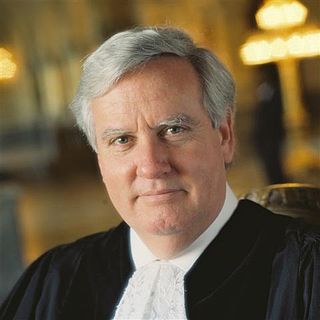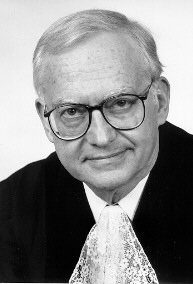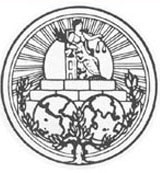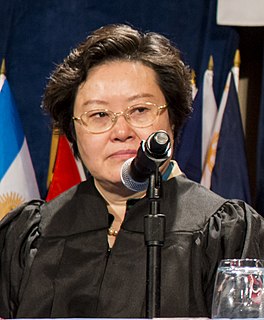Peter Tomka is a Slovak judge of the International Court of Justice. Prior to joining the ICJ, Tomka was a Slovak diplomat.
Abdulqawi Ahmed Yusuf is a Somali lawyer and judge who is the incumbent President of the International Court of Justice.

Sir Christopher John Greenwood is a former English judge at the International Court of Justice, on which he served from 2009 to 2018. Prior to his election, he was professor of international law at the London School of Economics and a barrister who regularly appeared as counsel before the International Court of Justice, the European Court of Human Rights, the English courts, and other tribunals.

United Nations Security Council Resolution 499, adopted unanimously on December 21, 1981, after noting the death of International Court of Justice (ICJ) judge Abdullah El-Erain, the Council decided that elections to the vacancy on the ICJ would take place at the Security Council and at the General Assembly's thirty-sixth session.

United Nations Security Council Resolution 570, adopted unanimously on 12 September 1985, after noting the death of International Court of Justice (ICJ) Judge Platon D. Morozov, the Council decided that elections to the vacancy on the ICJ would take place on 9 December 1985 at the Security Council and at the General Assembly's 40th session.

United Nations Security Council resolution 627, adopted unanimously on 9 January 1989, after noting the death of International Court of Justice (ICJ) President Nagendra Singh on 11 December 1988, the council decided that elections to the vacancy on the ICJ would take place on 18 April 1989 at the Security Council and at the General Assembly's 43rd session.

United Nations Security Council resolution 708, adopted unanimously on 28 August 1991, after noting the death of International Court of Justice (ICJ) President Taslim Olawale Elias on 14 August 1991, the council decided that elections to the vacancy on the ICJ would take place on 5 December 1991 at the Security Council and at the General Assembly's 46th session.

United Nations Security Council resolution 805, adopted unanimously on 4 February 1993, after noting the death of International Court of Justice (ICJ) judge Manfred Lachs on 14 January 1993, the Council decided that elections to the vacancy on the ICJ would take place on 10 May 1993 at the Security Council and at a meeting of the General Assembly during its 47th session.
United Nations Security Council Resolution 1914, adopted unanimously on 18 March 2010, after noting the resignation of International Court of Justice (ICJ) judge Shi Jiuyong and that the vacancy must be filled in accordance with the Statute of the ICJ, the Council decided that the election to fill the vacancy would take place on 29 June 2010 at a meeting of the Security Council and at a meeting of the General Assembly at its 64th session.

United Nations Security Council resolution 951, adopted without a vote on 21 October 1994, after noting the death of International Court of Justice (ICJ) judge Nikolai Konstantinovitch Tarassov on 28 September 1994, the Council decided that elections to the vacancy on the ICJ would take place on 26 January 1995 at the Security Council and at a meeting of the General Assembly during its 49th session.

United Nations Security Council resolution 979, adopted without a vote on 9 March 1995, after noting the death of International Court of Justice (ICJ) judge Roberto Ago on 24 February 1995, the Council decided that elections to the vacancy on the ICJ would take place on 21 June 1995 at the Security Council and at a meeting of the General Assembly during its 49th session.

United Nations Security Council resolution 980, adopted without a vote on 22 March 1995, after noting the resignation of International Court of Justice (ICJ) judge Sir Robert Yewdall Jennings which would take effect on 10 July 1995, the Council decided that elections to the vacancy on the ICJ would take place on 12 July 1995 at the Security Council and at a meeting of the General Assembly during its 49th session.

United Nations Security Council resolution 1018, adopted unanimously on 7 November 1995, after noting the death of International Court of Justice (ICJ) judge Andrés Aguilar-Mawdsley on 24 October 1995, the Council decided that elections to the vacancy on the ICJ would take place on 28 February 1996 at the Security Council and at a meeting of the General Assembly during its 50th session.

United Nations Security Council resolution 1278, adopted without a vote on 30 November 1999, after noting the resignation of International Court of Justice (ICJ) judge Stephen M. Schwebel taking effect on 29 February 2000, the Council decided that elections to the vacancy on the ICJ would take place on 2 March 2000 at the Security Council and at a meeting of the General Assembly during its 54th session.

United Nations Security Council Resolution 1926, adopted unanimously on June 2, 2010, after noting the resignation of International Court of Justice (ICJ) judge Thomas Buergenthal with effect from September 6, 2010. The Council decided that the election to fill the vacancy would take place on September 9, 2010 at a meeting of the Security Council and at a meeting of the General Assembly.

United Nations Security Council resolution 1361, adopted without a vote on 5 July 2001, after noting the resignation of International Court of Justice (ICJ) judge Mohammed Bedjaoui taking effect on 30 September 2001, the Council decided that elections to the vacancy on the ICJ would take place on 12 October 2001 at the Security Council and at a meeting of the General Assembly during its 56th session.

Xue Hanqin is a Chinese judge at the International Court of Justice. On 29 June 2010, she was elected to fill the vacancy created by Shi Jiuyong's resignation on 28 May 2010. She is one of three female judges serving on the ICJ and one of only four women elected as members of the Court to date. Xue is the fifth Chinese judge at the ICJ, and the third representing the People's Republic of China.

United Nations Security Council resolution 1571, adopted without a vote on 4 November 2004, after noting the resignation of International Court of Justice (ICJ) judge Gilbert Guillaume taking effect on 11 February 2005, the Council decided that elections to the vacancy on the ICJ would take place on 15 February 2005 at the Security Council and at a meeting of the General Assembly during its 59th session.
The 2011 International Court of Justice election began on 10 November 2011 at United Nations Headquarters in New York City. In the set of triennial elections, the General Assembly and the Security Council concurrently elect five judges to the Court for nine-year terms, in this case beginning on 6 February 2012. From the eight candidates, the five winners were Giorgio Gaja (Italy), Hisashi Owada (Japan), Peter Tomka (Slovakia), Xue Hanqin (China) and Julia Sebutinde (Uganda).












